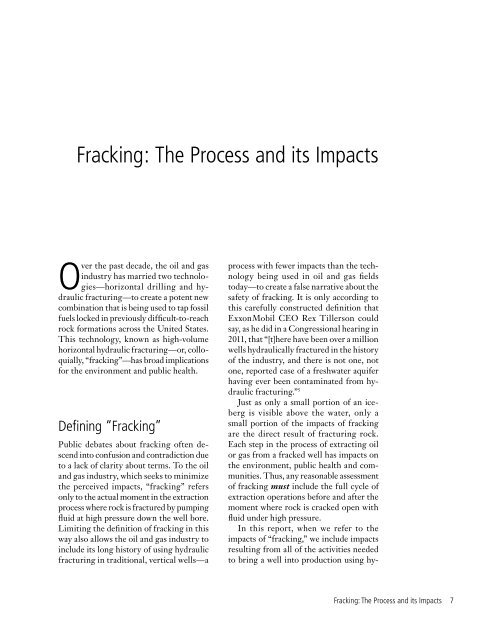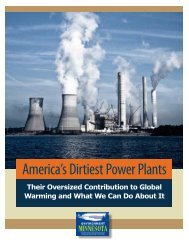The Costs of Fracking
The Costs of Fracking vMN.pdf - Environment Minnesota
The Costs of Fracking vMN.pdf - Environment Minnesota
Create successful ePaper yourself
Turn your PDF publications into a flip-book with our unique Google optimized e-Paper software.
<strong>Fracking</strong>: <strong>The</strong> Process and its Impacts<br />
Over the past decade, the oil and gas<br />
industry has married two technologies—horizontal<br />
drilling and hydraulic<br />
fracturing—to create a potent new<br />
combination that is being used to tap fossil<br />
fuels locked in previously difficult-to-reach<br />
rock formations across the United States.<br />
This technology, known as high-volume<br />
horizontal hydraulic fracturing—or, colloquially,<br />
“fracking”—has broad implications<br />
for the environment and public health.<br />
Defining “<strong>Fracking</strong>”<br />
Public debates about fracking <strong>of</strong>ten descend<br />
into confusion and contradiction due<br />
to a lack <strong>of</strong> clarity about terms. To the oil<br />
and gas industry, which seeks to minimize<br />
the perceived impacts, “fracking” refers<br />
only to the actual moment in the extraction<br />
process where rock is fractured by pumping<br />
fluid at high pressure down the well bore.<br />
Limiting the definition <strong>of</strong> fracking in this<br />
way also allows the oil and gas industry to<br />
include its long history <strong>of</strong> using hydraulic<br />
fracturing in traditional, vertical wells—a<br />
process with fewer impacts than the technology<br />
being used in oil and gas fields<br />
today—to create a false narrative about the<br />
safety <strong>of</strong> fracking. It is only according to<br />
this carefully constructed definition that<br />
ExxonMobil CEO Rex Tillerson could<br />
say, as he did in a Congressional hearing in<br />
2011, that “[t]here have been over a million<br />
wells hydraulically fractured in the history<br />
<strong>of</strong> the industry, and there is not one, not<br />
one, reported case <strong>of</strong> a freshwater aquifer<br />
having ever been contaminated from hydraulic<br />
fracturing.” 5<br />
Just as only a small portion <strong>of</strong> an iceberg<br />
is visible above the water, only a<br />
small portion <strong>of</strong> the impacts <strong>of</strong> fracking<br />
are the direct result <strong>of</strong> fracturing rock.<br />
Each step in the process <strong>of</strong> extracting oil<br />
or gas from a fracked well has impacts on<br />
the environment, public health and communities.<br />
Thus, any reasonable assessment<br />
<strong>of</strong> fracking must include the full cycle <strong>of</strong><br />
extraction operations before and after the<br />
moment where rock is cracked open with<br />
fluid under high pressure.<br />
In this report, when we refer to the<br />
impacts <strong>of</strong> “fracking,” we include impacts<br />
resulting from all <strong>of</strong> the activities needed<br />
to bring a well into production using hy-<br />
<strong>Fracking</strong>: <strong>The</strong> Process and its Impacts



